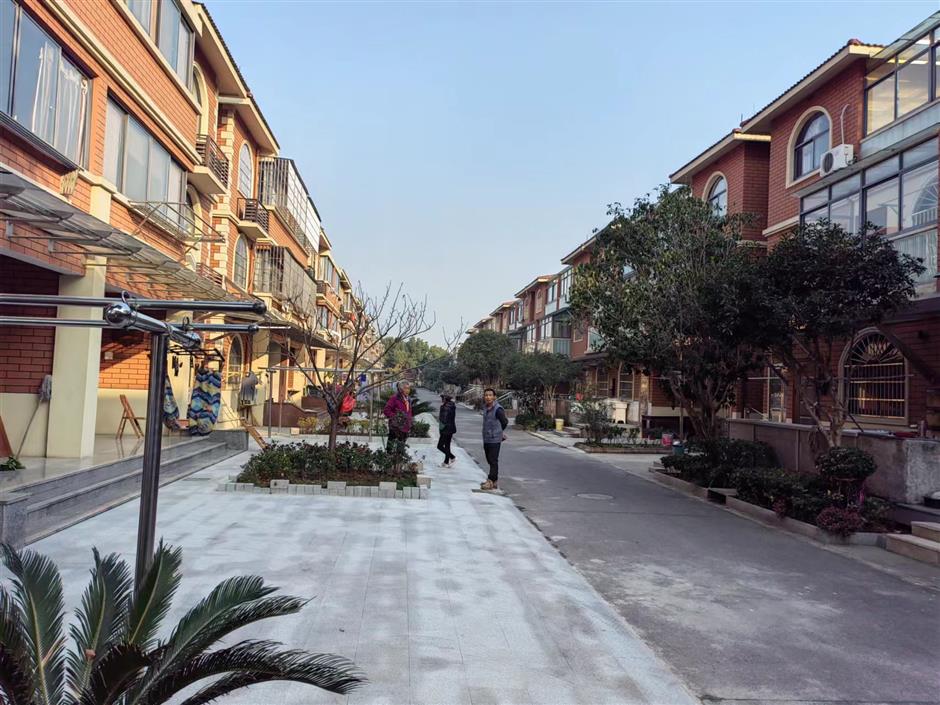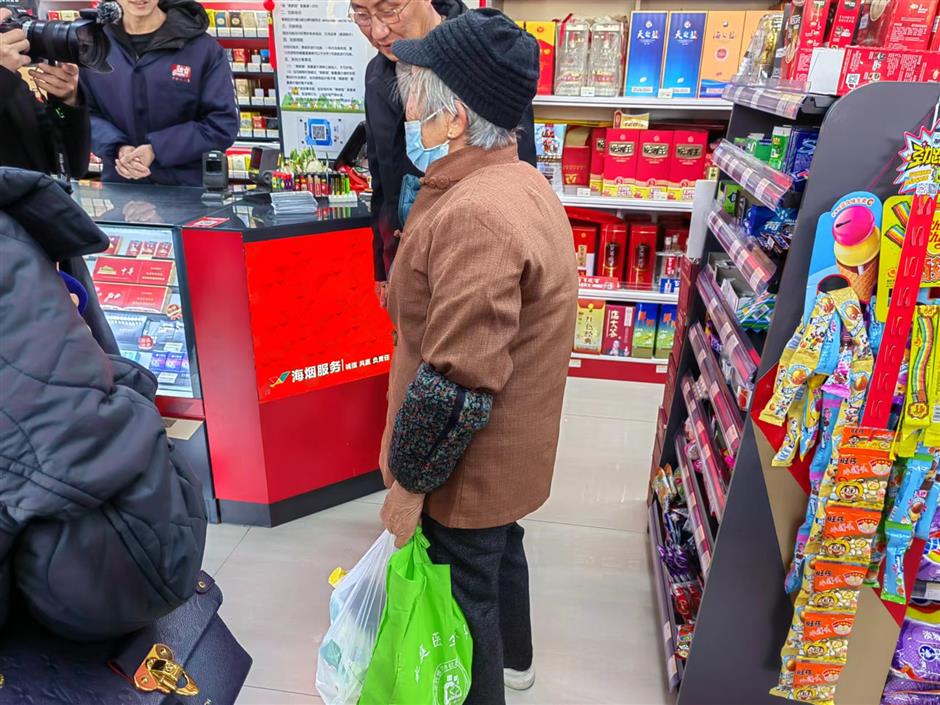
今日上海
奉贤的村庄是乡村振兴的亮点 - 2024年01月03日
Fengxian villages shed light on rural revitalization
To highlight three villages in the sprawling metropolis of Shanghai is not easy, but exceptions should be made for three villages in Fengxian which exemplify the myriad changes in the rural revitalization drive.
The Huangpu River, as it meanders toward the downtown area, flows mainly from West to East, until it reaches Xidu in Fengxian, where it suddenly turns to the north, almost at a right angle, and remains roughly in that direction before it empties into the Yangtze River.
The three villages, Xinye, Yuli and Puxiu, are all located immediately south of the river before its abrupt turn, and all are under the jurisdiction of Zhuanghang Town.
As a matter of fact, they have been chosen to showcase the improved rural living environment partly as a result of their location, being close to the mighty river and crisscrossed by smaller tributaries.
"Their proximity to the river defines their role as the safeguard of one of the city's major water sources, which translates into the improvement of living environments," said Gu Lifeng, a member of Xinye Village CPC committee, who also served as director for mediation work.
Xinye Village itself is low-altitude, boasting no less than five rivers that flow in all directions.
One river that flows through the village, Xinye Xipai River, used to be a receptacle of sewage discharged from pigsties. It became very narrow in the process, which then worsened the pollution.

The inhabitants of Xinye Village now live in row upon row of standardized three-storied buildings.
Thanks to the rectifications campaign in 2013, raising pigs was forbidden, the sewage stopped, and the river was widened to six meters, with straight concrete embankments flanked by trees.
No operational activities are allowed in the rivers, and this effectively avoids such pollutants as fodder and antibiotics used in raising aquatic products.
The rectified river is routinely policed by people, whose responsibility, among others, include salvaging plastic waste and fallen foliage.
The purity of the water is also ensured by the expanse of forest by the river planted for water conservation purpose.
In Puxiu Village, about 3 kilometers to the east from Xinye, there is a huge tract of forest not far away.
"Puxiu Village has relatively more such forest, given its relative longer space along the Huangpu River, while in our Xinye, we have less forest, for we are home to a municipal grains reserves granary, which takes up about 400 meters of the length of the Huangpu River bank," Gu said.
Gu also mentioned the jianliang hua imperative, literally meaning "quantitative land reduction," essentially concerning the gradual phase out of nonessential and polluting factories, particularly those with modest tax contributions, or small plants low in technology, or in efficiency.
The land thus committed would be restored for agricultural use.
Since the central government keeps close tabs on the aggregate amount of land for construction purposes, the added agricultural land would afford municipal government greater leeway in creating new construction space for prioritized industries in, say, downtown areas.
Gu went on to give a terminological clarification.
"We used to talk a lot about 'tenglong huanniao,' or replacing the bird in the cage with another species of bird, which is chiefly about replacing a lacklustre business with a more competitive entity that pays more tax, or represents an industrial upgrade," Gu said.
"The current talk of quantitative land reduction, however, amounts to wholesale elimination, with the old factory torn down, and the land given over to farming."
Gu then dwelt on the multiple benefits of putting up the former inhabitants in uniformly designed community. In the case of Xinye, they are in row upon row of three-storied buildings.
"In Shanghai, since certificate for land use in rural house building were given to villagers in 1987, in spite of the many changes in the family, the certificate has remained unchanged, and renewal of the certificates could not be satisfactorily addressed without thorough investigation," Gu said.
"So, in view of the general trend of downsizing of the rural area in the city, putting up the former inhabitants storied buildings might be part of the solution."
Another benefit is that the reclaimed land from former peasant homes might also serve to enlarge the pool of farm land.
"Formerly, a single household might take up about 400 square meters, with 200 square meters of building space plus about similar size of the courtyard, which could all count towards addition in new agricultural land.
Although some peasants' response to "going upstairs" was lukewarm initially, Gu said that after some persuasion, a considerable portion of them found it more acceptable, especially in view of the substantial financial inducements. For instance, a household is entitled to being assigned two units in storied buildings totaling about 200 squares meters, which they could either stay in or sell. Depending on the location, the compensation could be attractive.
Gu said that elderly villagers tend to have such attachment to the soil that in the new urbanized community, they would take to growing vegetables in whatever public space they could lay their hands on.

Yang Yaqin 86, shops with coupons awarded to her family for compliance with the village code of conduct.
To change their habits, in Xinye Village compound, there is now a monthly review of each household's compliance with the agreed upon code of conduct. Qualified households are awarded a coupon which can be redeemed for 20 yuan (US$3) worth of daily necessities from a designated store in the community.
The review is conducted jointly by village cadres, property management, and a wangge yuan, a sort of social worker entrusted with the mission of tackling various grassroots social contradictions.
During the first month of compliance checks, about 100 households did not pass muster, with problems ranging from growing vegetables in public areas, to failure to dispose properly of used and useless objects. Now the latter problem seems to predominate.
At the designated store, 86-year-old Yang Yaqin had just redeemed a bag of flour and some other necessities with her coupons.
Speaking in a dialect that is unique to the area, she explained how the coupon worked. To solicitations that her shopping might be too heavy for her, Yang kept protesting she was fully equal to its weight, and she was right.
In Yuli Village, local cadres also resort to an edition of three-character verses codifying the moral and ethical principles expected of a villager, in what is romantically known as "beautiful contract."
They ranged from proper manner of conducting a funeral or wedding, to advice on giving birth to, or bringing up a child.
"These verses of agreement have been settled upon after repeated consultations with many sides, and then have been duly publicized through different channels," said Chen Juming, first Party secretary of Yuli Village. He explained the practice in front a notice board written with three-character edition of the "beautiful village contract".
"The board was placed here because this is a traffic hub registering considerable number of passersby, and was also right next to a No 2 bus line in Zhuanghang Town," Chen explained.
There are also monthly art performance and other events aimed at driving home the message of the agreement, at the "neighborhood harmony gathering space."
The agreement also evolves over time.
Chen said that the first edition of the agreement was couched in a longer jingle, but had been condensed into the crispy three-character form in the current edition.
Source: Shanghai Daily

